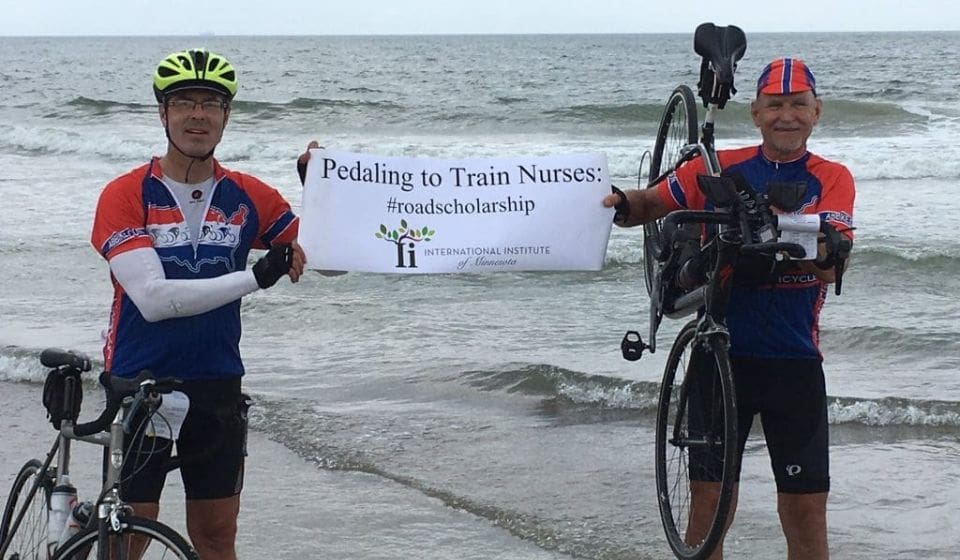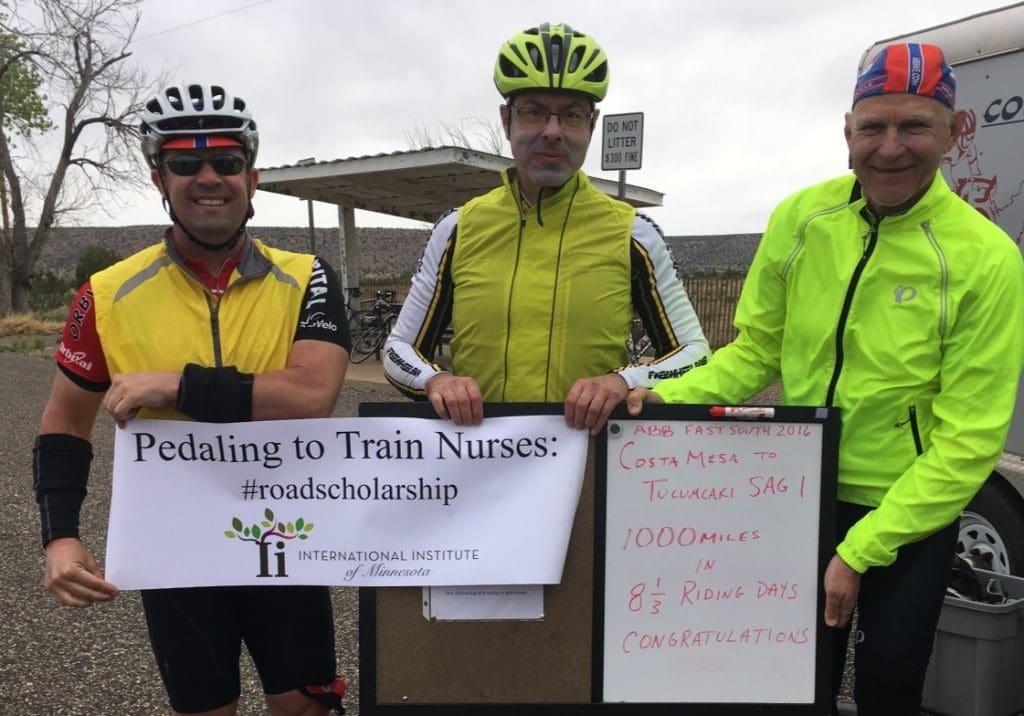Donor Story
Dr. Jeffrey Mandel’s Nursing Scholarships

June 8, 2020 | Working in the medical field is “a calling — it is a commitment above and beyond any salary or benefit; you have to want to do this from your heart; you have to believe in it,” Dr. Jeffrey Mandel (above left) affirms. Now a retired physician, Mandel is putting his heart into supporting New Americans who also feel a calling to serve.
Mandel joined the International Institute of Minnesota’s board of directors in 2014, and in addition to sharing his insights as a physician, his philanthropic spirit has had a great impact on the Institute, particularly in funding scholarships for immigrant students enrolled in nursing school and the Institute’s Medical Career Advancement program. In 2016, for example, Mandel biked 2880 miles from the Pacific Ocean at Costa Mesa, California to the Atlantic Ocean in Savannah, Georgia; over these 27 days, he urged the followers of his journey to support his Road Scholarship (now called the Mandel Scholarship) with a donation to help New Americans progress in their medical careers.
At the time, Mandel wrote, “I’ve met several of the graduates in my work as a physician and when visiting my father at Sholom Home nursing home. Not only are they excellent nurses, but they are some of the most caring and competent staff I’ve met.”
Every year, his generosity enables four students to receive scholarships that will allow them to continue pursuing their goals, whether that means becoming a licensed practical nurse or earning a Master of Science in nursing. The students also benefit from his insights at a group luncheon held every summer. After 26 years at Park Nicollet Methodist Hospital under his belt, Mandel has plenty of advice to share.
At these annual meetings, the group celebrates bright spots like their school accomplishments, discusses points of learning from the school year, and shares their career goals and progress. Mandel has also felt it important to address the barriers they were likely to experience as New Americans and people of color. Referencing interactions he has witnessed in his career, Mandel says he felt compelled to “talk about what it’s like to be treated poorly” by patients and other staff. He emphasized to the students “how important it is to stand up for yourself, to report intolerance, to insist that the place you’re working be a safe environment.”
Mandel says he would notice how patients treated him, a physician, more respectfully than other staff or people of color in the room. He recognized it was important for him, as a Caucasian person, to directly call out such behavior. Although he clearly hasn’t had the lived experience of a black immigrant nurse, for example, he says that as a Jewish man, he has his own understanding of what it’s like to be treated as a second-class citizen. Despite the discomfort in discussing such issues, Mandel says these convictions are something he wanted the MCA students to carry forward in their careers.

Considering his family history, it’s no surprise Mandel was drawn to support MCA scholarships. Several of his relatives have funded educational initiatives, and his family “has always embraced the value and necessity of education.” His uncle, Dr. Sheldon Mandel, also served as a mentor to Jeffrey; he practiced dermatology and taught at the University of Minnesota for more than 50 years. “I feel blessed to have such wonderful examples from my family and from experiences of the power, the possibilities and the life-changing potential of philanthropy, especially as it is directed to students and aspiring health care providers.”
In addition to valuing education, funding New American students’ education is a way to support those who have cared for Mandel’s family and who may even care for him in the future. When Mandel’s father was in an assisted living facility with Parkinson’s disease, many of the nurses who took care of him, including all of the night shift nurses, were New Americans. “They were the best caregivers,” he remembers. “You can teach science, but it’s really hard to teach a bedside manner. If you don’t feel it in your heart, there’s something missing. People that took care of Dad felt it in their heart.”
“What I’ve seen in the Institute students I’ve met,” Mandel adds, “appeared to be that same ethos and same concern for the individual, for the soul they are touching when they care for others.” He also notes that one of the unique strengths that New Americans bring to health care is that many come from backgrounds in which commitment to family and to caring for the elderly is particularly stressed, a value that may not be as strongly expressed in U.S. culture. Furthermore, the multilingual abilities of many New Americans can reduce the need for translators in medical settings.
New Americans “are not taking jobs away from people, any more than I took a job as a physician away from someone else — they are contributing and adding to our communities,” Mandel asserts. Speaking about the Institute’s scholarship program, he notes that it is important not only for the organization and students, but for the community at large. “There is a basic need for the Institute and the wonderful programs it provides,” Mandel says, stressing that New Americans must have access to education and career development.
“We have a nursing shortage that will only get bigger as our population ages, and the fact that the Institute can help train these students affects our community and our state in ways that you don’t know until something like this, the coronavirus pandemic, happens — it requires people to put their lives on the line.”
“These students who come from the International Institute feel it in their bones,” Mandel adds. “They know what it’s like to be committed to the care of an individual as if caring for their own family members.”
Thank you, Dr. Mandel, for your years of service and generosity to the International Institute of Minnesota and its students.
Interested in learning more? Read another donor story from Laura and Ben Cooper, supporters of MCA scholarships and many other Institute programs, or contact Development Director Cori Ertz (651-647-0191, ext. 366) to learn how you, too, can support this critical program.